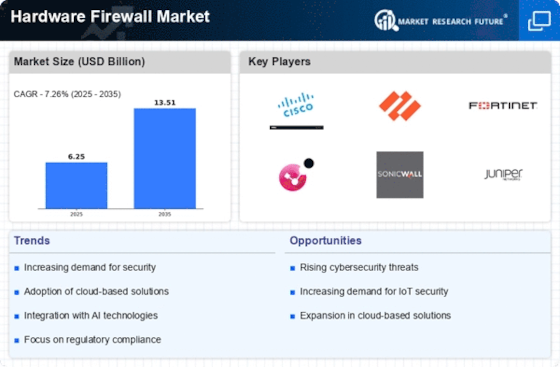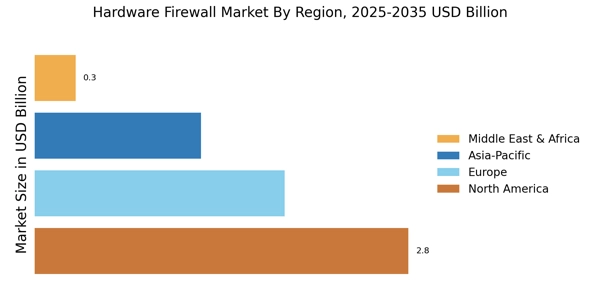Adoption of Remote Work Policies
The shift towards remote work has significantly influenced the Hardware Firewall Market. As organizations embrace flexible work arrangements, the need for secure remote access to corporate networks has become paramount. Hardware firewalls provide essential protection against potential vulnerabilities associated with remote connections. Data indicates that a substantial percentage of companies are investing in hardware firewalls to facilitate secure remote work environments. This trend is likely to continue as businesses recognize the importance of maintaining security while enabling employees to work from various locations. The Hardware Firewall Market is expected to benefit from this ongoing transition, as organizations prioritize secure access solutions.
Increasing Cybersecurity Threats
The rise in cybersecurity threats is a primary driver for the Hardware Firewall Market. Organizations are increasingly facing sophisticated attacks, including ransomware and phishing, which necessitate robust security measures. According to recent data, the number of reported cyber incidents has surged, prompting businesses to invest in hardware firewalls to safeguard their networks. This trend is particularly evident in sectors such as finance and healthcare, where sensitive data is at risk. As a result, the demand for hardware firewalls is expected to grow, as companies seek to enhance their security posture against evolving threats. The Hardware Firewall Market is likely to see a significant uptick in sales as organizations prioritize cybersecurity investments.
Regulatory Compliance Requirements
Regulatory compliance is becoming increasingly stringent across various industries, driving the Hardware Firewall Market. Organizations are required to adhere to regulations such as GDPR, HIPAA, and PCI DSS, which mandate the protection of sensitive data. Failure to comply can result in hefty fines and reputational damage. Consequently, businesses are investing in hardware firewalls to ensure they meet these compliance standards. The market for hardware firewalls is projected to expand as companies recognize the importance of maintaining compliance to avoid legal repercussions. This trend underscores the critical role that hardware firewalls play in the overall security strategy of organizations, making them indispensable in the current regulatory landscape.
Technological Advancements in Firewall Solutions
Technological advancements are propelling the Hardware Firewall Market forward. Innovations such as next-generation firewalls (NGFW) offer enhanced features, including intrusion prevention systems and application awareness. These advancements enable organizations to better protect their networks against sophisticated threats. The market is witnessing a shift towards more integrated solutions that combine hardware and software capabilities. As businesses seek to leverage these advanced technologies, the demand for hardware firewalls is likely to increase. The Hardware Firewall Market stands to gain from the continuous evolution of firewall technologies, as organizations strive to stay ahead of emerging cyber threats.
Growing Awareness of Cybersecurity Best Practices
There is a growing awareness of cybersecurity best practices among organizations, which is driving the Hardware Firewall Market. As businesses recognize the importance of implementing comprehensive security measures, hardware firewalls are increasingly viewed as essential components of their cybersecurity strategies. Educational initiatives and industry reports have highlighted the need for robust security solutions, leading to increased investments in hardware firewalls. This heightened awareness is likely to result in a sustained demand for hardware firewalls, as organizations seek to fortify their defenses against potential cyber threats. The Hardware Firewall Market is poised for growth as more companies prioritize cybersecurity education and investment.
















